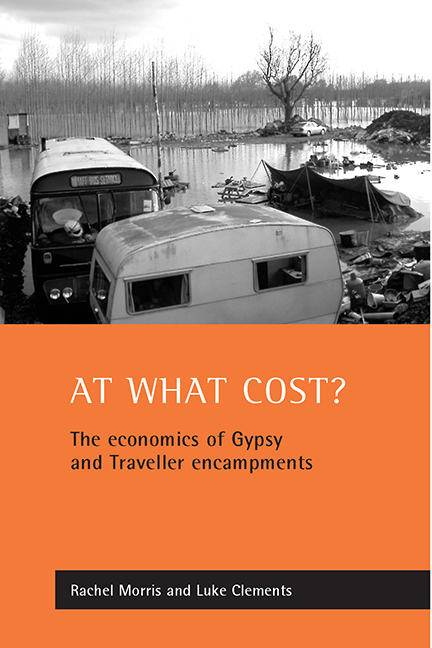Book contents
- Frontmatter
- Contents
- List of tables
- Preface
- Acknowledgements
- List of acronyms
- Dedication
- one Introduction
- two Past and present law
- three The costs to local authorities
- four The costs to others
- five Best Value
- six Rights, race relations and Best Value
- seven Conclusion: obstacles and opportunities
- References
- Appendices
- Index
- Also available from The Policy Press
F - Best Value and unauthorised encampments in Dorset
Published online by Cambridge University Press: 20 January 2022
- Frontmatter
- Contents
- List of tables
- Preface
- Acknowledgements
- List of acronyms
- Dedication
- one Introduction
- two Past and present law
- three The costs to local authorities
- four The costs to others
- five Best Value
- six Rights, race relations and Best Value
- seven Conclusion: obstacles and opportunities
- References
- Appendices
- Index
- Also available from The Policy Press
Summary
The following dialogue is from a question and answer session with David Ayre, Environmental Services, Dorset County Council, July 2000 TLRU seminar (see p 83).
Can traditional stopping places such as Shaftesbury Common be considered ‘services’ in Best Value terms?
Lack or removal of them costs money, so ‘economy, efficiency and effectiveness’ as proscribed by Best Value are very much an issue.
It is clear that Dorset have undertaken a quasi-Best Value review of Travellerrelated services. Where therefore is the ‘compete’ element?
This is difficult: in some ways the Council is competing with itself, and also with Government guidance and research as it comes out. And some elements of managing unauthorised encampments involve a competitive element, such as the use and choice of contractors.
Surely encampments do not fit comfortably as a Best Value issue?
The last Government surely thought so since they used the cost of site provision (£56 million over 24 years) as a justification to remove the duty to provide them. It may of course depend on an authority's policy statement as mentioned previously, but you cannot know whether something is ‘cost effective’ unless you know the costs and can identify the means and ends of a policy (or the lack of a policy).
How do you obtain the cooperation of other authorities such as districts for such a policy as that operated by Dorset County Council?
District councils are happy to be co-operative when the County largely undertakes the work. Inter-agency working at all levels also helps, so that all involved understand the policies and processes at work.
Were targets and outcomes set as part of Dorset's programme?
No, as this was before Best Value came in. It is difficult to identify quantitative measures anyway, aside from savings, as the number of unauthorised encampments is not always predictable and may depend upon the action (or inaction) of other local authority areas.
Could meaningful performance indicators in this area include reduction in the costs of cleaning encampments, or in staff costs of dealing with complaints?
Absolutely, either because toleration means there are less encampments overall and/or because of improved liaison, negotiation and relationships with the residents of encampments and the public generally. There may also be ‘positive’ measures such as improved educational attainment by Travellers, or improvements in sustainability programmes and targets of authorities. Objectives can be realistically set in relation to these examples.
- Type
- Chapter
- Information
- At What Cost?The Economics of Gypsy and Traveller Encampments, pp. 141 - 142Publisher: Bristol University PressPrint publication year: 2002

